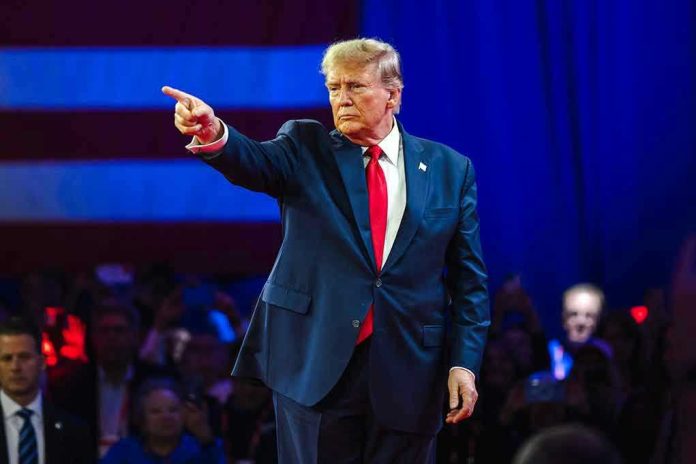
Trump’s Middle East envoy is refusing to leave Egypt until Hamas releases Israeli hostages and the Gaza war ends, signaling a bold new stand against weak-kneed diplomacy and wavering globalists.
Story Snapshot
- Trump’s envoy vows to remain in Egypt until Hamas releases all Israeli hostages and commits to ending the Gaza war.
- This hardline approach contrasts with years of stalled negotiations and perceived diplomatic weakness.
- Egypt’s mediation role is center stage, but Hamas continues to stonewall, keeping the region in crisis.
- Expert analysis is divided on whether this tactic will break the deadlock or further complicate talks.
Envoy’s Hardline Stand: No Departure Without Hostages Freed
Trump’s appointed Middle East envoy has publicly declared he will not leave Cairo until every Israeli hostage is released and the war in Gaza is brought to an end. This approach, rarely seen in modern diplomacy, underscores a sharp break from the past administration’s hands-off tactics and signals a willingness to leverage personal commitment for national and allied interests. The envoy’s move has drawn substantial media attention, especially among those frustrated with years of indecisive U.S. policy in the Middle East.
The envoy’s refusal to depart Egypt is intended to apply direct pressure on both Hamas and regional mediators. By remaining physically present, he aims to keep the spotlight on Hamas’ ongoing hostage crisis and the suffering of innocent civilians. Supporters argue this stance demonstrates resolve and commitment to core American and allied values, while critics question its effectiveness, warning it could be perceived as a mere publicity stunt if negotiations remain deadlocked. Regardless, the envoy’s actions have sharply differentiated the Trump administration’s strategy from prior efforts, which often appeared to lack urgency and accountability.
Background: Egypt, Hamas, and the Stalled Negotiations
Since Hamas’s attack on Israel in October 2023, the region has been locked in a brutal cycle of violence and failed negotiations. Egypt, with its unique geographic and diplomatic position, has repeatedly attempted to broker ceasefires and hostage releases. Yet, talks have broken down over key issues, including Hamas’s demand for prisoner swaps and security guarantees, and Israel’s insistence on the unconditional release of hostages. The Trump administration’s envoy has shifted the dynamic by making personal presence a bargaining chip, forcing all parties to confront the humanitarian and political costs of continued stalemate.
Egypt’s government, led by President Abdel Fattah el-Sisi, now faces mounting pressure to deliver results, balancing its regional alliances and international reputation. The Trump envoy’s high-profile move has intensified those pressures, drawing the world’s attention to both Egypt’s and Hamas’s roles in resolving—or prolonging—the crisis. Hamas’s leadership remains defiant, reiterating demands for full ceasefire and broad prisoner releases. Meanwhile, Israeli officials have made clear that no ceasefire is possible without the hostages’ safe return.
Impact: Raising the Stakes for All Sides
The envoy’s stand has immediate and long-term implications for the region and U.S. foreign policy. In the short term, it increases diplomatic and media pressure on Hamas and Egypt, raising the cost of inaction. For families of Israeli hostages, the envoy’s commitment offers hope that American leadership is finally taking their plight seriously. For Palestinian civilians, however, the ongoing deadlock means continued hardship, displacement, and uncertainty. International humanitarian organizations warn that the situation in Gaza remains dire, with no breakthrough in sight.
Looking ahead, this tactic could set a precedent for future negotiations involving high-stakes hostages or prolonged conflicts. While some experts warn that tying diplomatic presence to specific outcomes may backfire or prolong talks, others see it as a necessary response to years of failed negotiations and empty threats. Ultimately, the Trump administration’s willingness to act—and be seen acting—on conservative principles of strength, resolve, and accountability may reshape the rules of Middle East diplomacy for years to come.
Expert and Media Reactions: Divided Over Tactics, United on Deadlock
Expert analysis from think tanks and former diplomats highlights both the risks and potential rewards of the envoy’s approach. The Middle East Institute notes that Egypt’s unique leverage could prove decisive, but cautions that highly visible diplomatic standoffs sometimes escalate tensions rather than resolve them. The Brookings Institution and veteran U.S. diplomats point to the limits of personal diplomacy in entrenched conflicts, warning that ultimatums can backfire if not coupled with multilateral engagement and confidence-building.
Media coverage from Reuters, The New York Times, and Al Jazeera corroborates the ongoing deadlock, with no immediate resolution in sight. All agree that Egypt’s role as mediator remains essential, but the ultimate outcome will depend on the willingness of Hamas, Israel, and their international backers to make real concessions. For now, the Trump envoy’s bold stand has put the world’s focus back on the hostages and exposed the inadequacies of past diplomatic efforts that failed to deliver results for America and its allies.
Sources:
Kushner, Witkoff won’t leave Egypt without agreement to release Israeli hostages, end Gaza war
Witkoff and Kushner won’t leave Egypt without a deal, US official vows
Hamas faces ‘complete obliteration’ if it clings to power in Gaza, warns Trump




